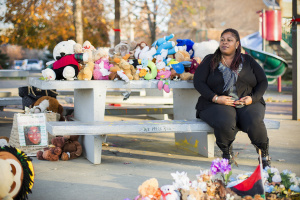
On May 4 at Kent State University in Ohio, community and student activists gathered. Not only did they condemn the state violence of the past on the 46th anniversary of the Kent State Massacre that left four students dead, but tied the actions and repression against the anti-Vietnam war activists who stood up to imperialist war and racism to the Black Lives Matter movement today.
Featured speakers included Samaria Rice whose son Tamir Rice was murdered in cold blood by Officer Timothy Loehmann. The former governor of Ohio, Jim Rhodes, who ordered the killings of the students at Kent State University in 1970 and Officer Timothy Loehmann, who last year killed Tamir Rice, have been let off for their heinous crimes, crimes carried out in a war against the people.
The Kent chapter of Students for a Democratic Society and the campus Black United Students organization spearheaded some of the most radical and militant protests 46 years ago, and by May 4th thousands of students had walked out of classes and were occupyingthe university, essentially turning it into a “liberated zone.”
Chynna Baldwin, the current president of BUS, gave remarks about the relation between state violence in 1970 and state violence today, including the policemurder of Tamir Rice. “We live in a world where the very people sworn to protect us are the ones who we must fear,” she remarked about police violence. “There is no discussion about whether the students [on May 4 th ] deserved to be killed,” she continued.
Baldwin opened for the keynote speaker of the event, Samaria Rice, mother of Tamir Rice, an African American boy who was killed by police while playing with a toy gun in a Cleveland park. The officers who fired upon arrival at the park did not bother to administer first aid to the 12-year-old victim who died the following day.
“I am the mother of Tamir Rice, and I would like to share my story with you guys…it was a normal Saturday afternoon, midday per se, that day Tamir and Tanjay wanted to go to the recreation center early…it’s not open on Saturdays but they wanted to go out there to use the WiFi. They were also outside playing at the park…Tanjay and Tamir came home early that day, and I gave them money to go to the store to get juice and snacks…about 3 PM, I got a knock from two of the neighborhood kids that the Cleveland Police just shot my son Tamir…I was very much in shock…I’m like ‘no, y’all don’t know what you’re talking about’…my son was laying on the ground, I tried to go for him and they [the police] told me to calm down or they would [arrest me],”said Rice about her response to the nightmarish news.
“…at that time I asked them to let my daughter go [let her out of the police car]…they gave me an ultimatum that I could stay with my daughter or go with my son [to the hospital]…the struggle has been quite real for me…I thought the prosecutor was on my side…I was kinda oblivious to what was going on in America until it happened to my son,” said Rice as she stood in solidarity with those who stood for justice at that same place in 1970.
“They tried to blame it on us,” she continued.

But Samaria Rice and others remembering the massacre at Kent State University know that the blame is on a system reliant on violence against the people to create terror and fear. However, the continued struggle for justice has forged only deeper roots of solidarity.





